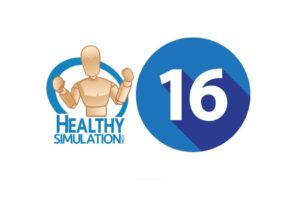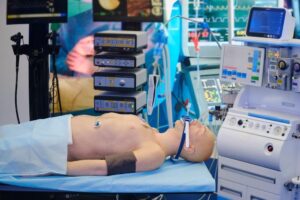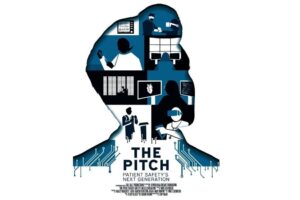Dr. Berry’s Academic Nursing Leaders Blog Encourages Healthcare Simulation in Nursing
In working with others to design and build the future of healthcare in academic nursing, Devon M. Berry, Ph.D., RN, created a next-gen academic nursing leaders blog that serves as a forum for the nursing community. His blog touches on elements of healthcare simulation and especially caters to those interested in creating next-era academic nursing. The blog’s goal is to challenge the thinking of both current and future academic nursing leaders while they engage in compelling conversations about the field. Here we take a look at some of Dr. Berry’s work which supports the use of nursing simulation!
“I aspire to accomplish this through serial blogs dedicated to annual themes, occasional blogs reacting to current events, and audio interviews with leaders inside and outside the profession,” Berry writes. “Most of today’s digital sources for current or aspiring academic nursing leaders are tied to professional organizations. These sites are robust resources but they are not necessarily designed to support the free-flow of conversation that is needed when leaders are trying to hammer out forward-thinking ideas in real-time.”
Berry’s blog complements existing digital resources by creating a venue for advancing academic nursing through the sometimes messy process of thinking out loud. His blog topics cover different facets of the nursing workforce such as the future of clinical nursing education.
Sponsored Content:
“Let’s Dream a Little Dream About the Future of Clinical Nursing Education”
In this blog post, Berry discusses the “unraveling of the entire process of clinically educating the next generation of nurses” in the spring of 2020 due to COVID-19. He explains how the pandemic has forced nursing education to face severe and long-standing efficiency and effectiveness problems in its entire clinically-based approach. Berry notes the following problems across the field of nursing as a result of the coronavirus:
- The continuous lack of appropriate placements for nursing learners
- The inability to control the quality of the learning experience
- The lack of robust and feasible measures for systematically documenting progression toward competence
- The inordinate amount of resources expended on clinical placement and clinical education by nursing programs and healthcare agencies
- The unsatisfactory results of consortia and sophisticated software in simplifying and improving the process
- The perceived one-way exchange of value between nursing programs and healthcare agencies (i.e., learners “take” but do not “give”)
- The tensions created between and among nursing programs and healthcare agencies as they negotiate perceptions of unfairness and the imbalance between the supply and demand of clinical placements
- Since COVID, the concerns older or medically vulnerable faculty have with being in care settings
Berry explains this situation has created the need for educators to dream about how the field can improve in order to better meet the needs of learners despite COVID-19. Specifically, he suggests that simulation-based education may be able to position educators to transition the vast majority of clinically-based education from healthcare agencies to fully-simulated acute and ambulatory healthcare systems.
“Having witnessed the nightmare of clinical education in 2020, we should not leave things as they are. We have been jolted awake into reckoning with the many weaknesses of our current approach,” Berry says. “Though it seems counterintuitive, in our awakened state we need to start by dreaming together — a big diverse group of learners, publishers, vendors, providers, academicians, pedagogists, sim experts, business people, regulators and others — to discover together what a better future can look like.”
Sponsored Content:
“New Wine, Old Skins”
Another blog post written by Berry, “New Wine, Old Skins,” also looks at the interesting crossroads in nursing education created by the pandemic. Despite innovation in lab-based simulation, screen-based simulation and other adaptations of the clinical environment, he says there are still too few clinical simulation placements and too few simulation educators.
“As we rapidly innovate new approaches to educate our students with aspirations to improve upon our prior levels of educational achievement, will we as a profession continue to force these new ways into old paradigms?” Berry questions.
Ultimately, he shares that nursing education is currently faced with an incredible opportunity to build on past achievements. However, he notes that what is built for the future should not look like the past. By this Berry means that nursing education needs to change and, by all indications, the sooner the better.
Check out these other ANL blog posts:
- What Shall We Become?
- Improving Operations – The Prep
- Take Another Step
- Observing Operations
- Dear New Nursing Grad, Fret Not
More About Devon Berry
Devon Berry, Ph.D., RN, is an academic nursing leader who has held leadership and faculty positions at Oregon Health & Science University, Wright State University, University of Cincinnati and Cedarville University. He most recently served as the executive associate dean at OHSU. Berry currently resides in Portland, Oregon, and is pursuing deferred professional goals, consulting, spending time with family, training for a marathon and plotting his next steps as a professional to maximize his impact on his community. Berry remains convinced that academic nursing has a lot more to give society, and plans to continue working with others to design and build the future of academic nursing.
“As an academician and a nurse, I have the privilege of frequently witnessing the power of individuals and groups to transform the lives of others. Whether by forming the mind through education, healing the body through healthcare, or discovering the future through research, I deeply value the opportunity to meaningfully shape lives through my work,” Berry writes. “As a result, I have a strong sense of stewardship for leading in a manner that is characterized by excellence (leading an organization to its highest level of performance), effectiveness (consistently delivering on mission and always progressing toward vision), and efficiency (executing in a manner that optimizes the use of the resources available).”
Berry emphasizes that, across healthcare, more crucial than vision, strategy and execution, however, are people. Thus, his current professional pursuits have coalesced around three key areas that are critical to the next era of higher education:
- An organizational culture that prizes the achievement of outcomes through continuous improvement, operational proficiency and the integration of missions;
- An educational approach that thrives on evidence-informed pedagogical innovation; and
- An unwavering commitment to quality and access in the social mission of higher education.
In the future, Berry believes the best universities, colleges and other entities with a postsecondary educational focus will be characterized by qualities such as these. At these crossroads, he says business, higher education and the community must converge in a spirit of partnership, innovation and entrepreneurship.
Learn More About Devon Berry’s NEXT-ANL Blog
Lance Baily, BA, EMT-B, is the Founder & CEO of HealthySimulation.com, which he started while serving as the Director of the Nevada System of Higher Education’s Clinical Simulation Center of Las Vegas back in 2010. Lance is also the Founder and acting Advisor to the Board of SimGHOSTS.org, the world’s only non-profit organization dedicated to supporting professionals operating healthcare simulation technologies. His co-edited Book: “Comprehensive Healthcare Simulation: Operations, Technology, and Innovative Practice” is cited as a key source for professional certification in the industry. Lance’s background also includes serving as a Simulation Technology Specialist for the LA Community College District, EMS fire fighting, Hollywood movie production, rescue diving, and global travel. He and his wife Abigail Baily, PhD live in Las Vegas, Nevada with their two amazing daughters.
Sponsored Content:


















